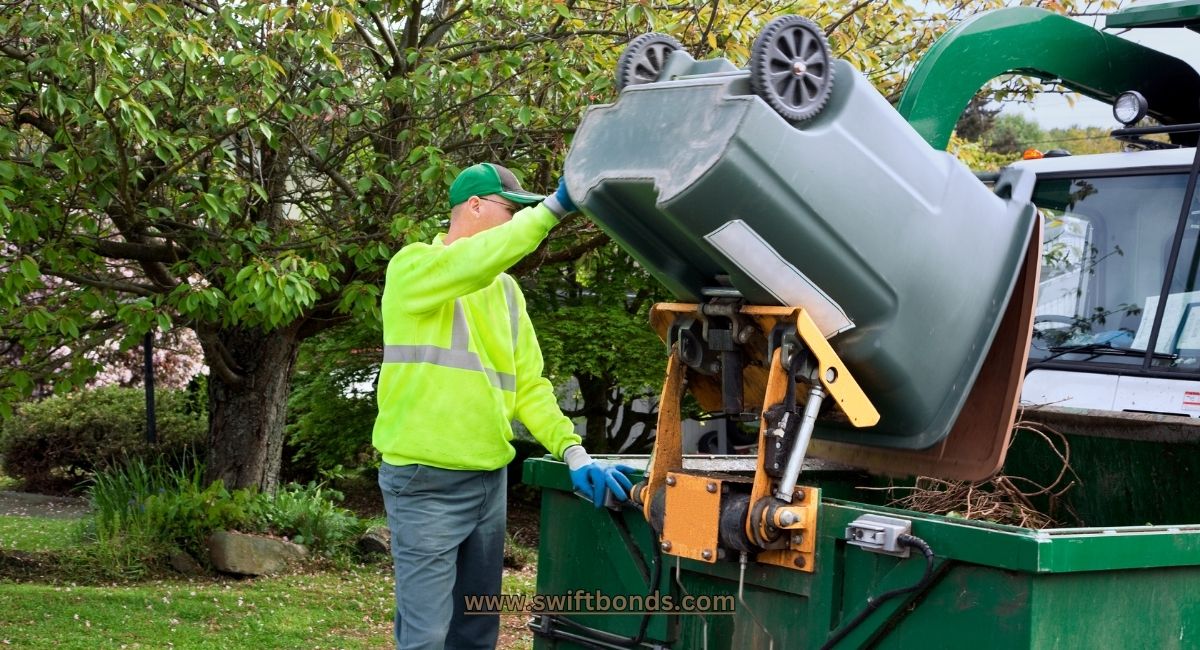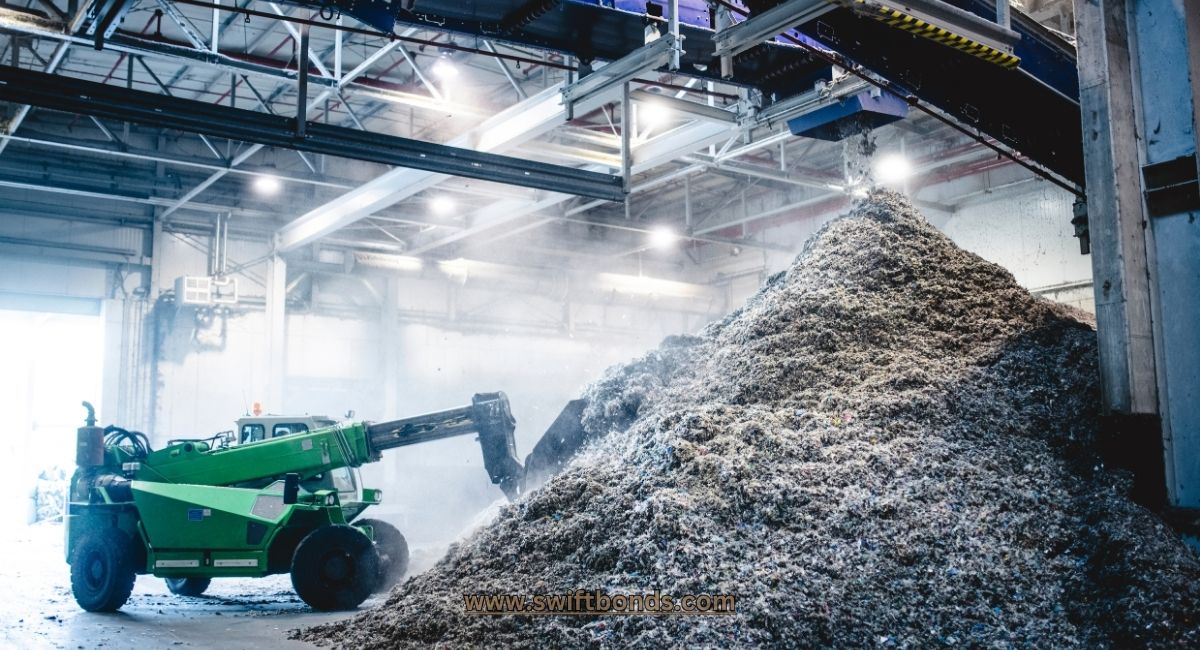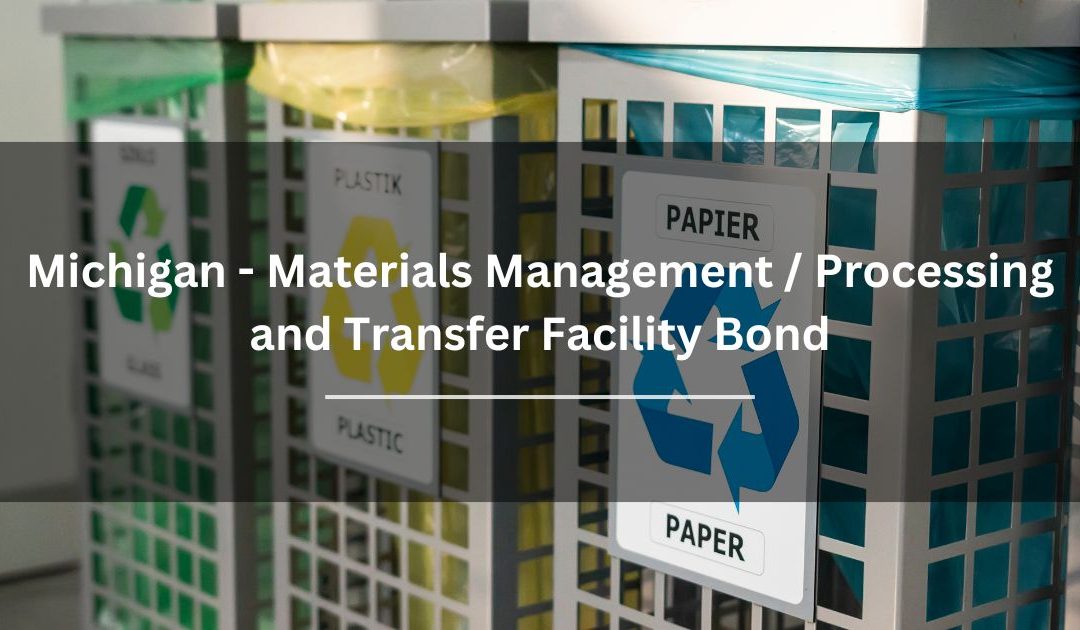Get an Instant Quote on Materials Management / Processing and Transfer Facility Bond
Introduction
From our perspective, professionals managing waste processing and transfer facilities in Michigan carry a significant responsibility. Whether handling municipal solid waste, industrial byproducts, or recyclable materials, these operations must stay compliant with environmental and financial standards. That journey often begins with securing the Michigan - Materials Management / Processing and Transfer Facility Bond.
This bond acts as a financial guarantee to the state of Michigan that your facility will operate within environmental laws and properly close or restore the site if operations cease. It’s not just a permit formality—it safeguards the public and state funds from cleanup liabilities. The bond supports the Michigan Department of Environment, Great Lakes, and Energy (EGLE) in holding operators accountable.
Unlike project-specific bonds like the Michigan DOT - Individual Right of Way Permit Bond, which applies to road access, this bond is tied directly to long-term environmental oversight. It allows operators to build trust with EGLE and focus on safe, uninterrupted service without the threat of financial uncertainty.
Bonding Confusion Causes Delays
We’ve noticed that many facility managers assume this bond functions like general business insurance or a performance bond. That misconception often leads to misfiled forms or delayed permit renewals. The Michigan - Materials Management / Processing and Transfer Facility Bond has a highly specific purpose: to guarantee financial responsibility for closure, cleanup, and regulatory compliance.
Some operators mistakenly apply the rules governing construction access—such as the Michigan DOT - Individual Right of Way Permit Bond—to materials processing permits. These bonds are not interchangeable. EGLE requires specific forms and language tailored to Michigan’s Solid Waste Management Program. If the bond is incomplete or incorrect, your site plan may be rejected or your operating license suspended.
We’ve seen facilities lose weeks—sometimes months—waiting to correct bonding issues. That kind of delay can halt operations or block expansion approvals.

Swiftbonds Delivers Precise Bonding
Based on our experience, the key to meeting EGLE’s requirements is getting the right bond from the start. Swiftbonds works with facility owners and environmental consultants across Michigan to issue the Michigan - Materials Management / Processing and Transfer Facility Bond in full compliance with state expectations.
We walk you through the application process and tailor the bond to your site’s scale, waste category, and closure cost estimate. Our process eliminates guesswork. Once approved, we issue the bond with all required endorsements, forms, and coverages—so you can file it without any risk of rejection.
We provide similar service to contractors needing state-level bonds, such as the Michigan DOT - Individual Right of Way Permit Bond, ensuring every document meets agency-specific standards.

Steps To Compliant Bonding
What we’ve discovered is that facility operators succeed with environmental bonds when they follow a consistent approach:
-
Contact EGLE to determine the bond requirement
This varies based on facility type (processing vs. transfer), waste type, and estimated closure costs. -
Request your bond form and financial assurance worksheet
EGLE provides these as part of the permit package. Bond amounts are based on a cost projection for site restoration. -
Apply with Swiftbonds
Submit your facility details, location, waste classification, and EGLE documentation. We prepare the correct bond and endorsements. -
Pay your premium
Rates vary by financial risk and bond amount. Swiftbonds offers fast quotes and competitive pricing. -
Submit your bond to EGLE with your facility license application or renewal
The bond must be active to obtain or maintain approval.
While this bond is specific to environmental oversight, contractors working in transportation zones follow a similar process when applying for the Michigan DOT - Individual Right of Way Permit Bond, emphasizing how procedural accuracy supports timely approvals across the board.

Delays Can Shut Down Operations
We’ve found that failing to bond correctly can stop your facility from opening—or cause an unexpected shutdown. Without an active Michigan - Materials Management / Processing and Transfer Facility Bond, EGLE will not issue or renew your license. For facilities that depend on daily tipping fees, even short delays can strain cash flow and reduce hauling commitments.
Late bonding can also trigger inspections or fines. If your site exceeds allowable waste thresholds while operating without a bond, the state may treat that as a violation, potentially resulting in enforcement action.
The same risks apply to construction contractors who fail to provide the Michigan DOT - Individual Right of Way Permit Bond before starting highway access projects. In both cases, getting the bond right avoids regulatory conflict.

Wrong Bonds Create Compliance Risks
In our observation, using the wrong bond can be just as damaging as no bond at all. We’ve seen operators mistakenly file general liability coverage or construction guarantees when what’s actually needed is the Michigan - Materials Management / Processing and Transfer Facility Bond. These documents are not recognized by EGLE and cannot be used to fulfill financial assurance requirements.
We've also seen confusion with similarly named environmental instruments, like the Michigan - Materials Management / Anaerobic Digester Bond, which applies only to waste-to-energy operations using digestion systems. While both bonds fall under EGLE’s purview, they serve different industries and have separate criteria.
Misfiling any of these can lead to rejected permits, missed deadlines, or worse—having to start the process from scratch.
Correct Bonding Builds Credibility
We’ve learned that facilities that secure their bond early and correctly are far more likely to maintain long-term compliance and positive working relationships with regulators. By submitting the Michigan - Materials Management / Processing and Transfer Facility Bond on time, with the correct formatting and surety documentation, you eliminate red flags and demonstrate readiness.
Swiftbonds supports that success. Whether you're applying for a first-time facility license, renewing an existing site, or launching a secondary operation like an Anaerobic Digester Bond site, we help you stay organized and approved.
We provide the same accuracy for transportation contractors handling state access permits with the Michigan DOT - Individual Right of Way Permit Bond. Every bond we issue is customized for your agency’s language, so you can file it once and move forward.
Michigan Environmental Bonding Requirements
Michigan environmental facilities are regulated under Part 115 of the Natural Resources and Environmental Protection Act (NREPA). EGLE enforces bonding and financial assurance under this statute, which governs solid waste management, closure plans, and site restoration.
The Michigan - Materials Management / Processing and Transfer Facility Bond is one of several financial tools allowed by Part 115. It must be maintained for the duration of the facility’s operation and until closure obligations are fulfilled.
Michigan provides public bonding guidance through:
Bond forms and closure estimates must be reviewed by EGLE before approval.
Conclusion
We’ve come to appreciate how the Michigan - Materials Management / Processing and Transfer Facility Bond empowers facility operators to meet environmental obligations without delays or confusion. It protects the public, the site, and the state—while giving facility managers the confidence to grow their services.
Swiftbonds makes the process seamless. Whether you're submitting environmental bonds or applying for access with the Michigan DOT - Individual Right of Way Permit Bond, we’ll guide you through it with speed, clarity, and the right documentation.
Frequently Asked Questions
What does this bond guarantee?
We’ve often noticed questions about bond coverage. This bond guarantees that your facility will meet its closure and cleanup obligations, even if operations stop or your company can’t perform.
How is this different from an Anaerobic Digester Bond?
We’ve often noticed confusion between waste categories. The Michigan - Materials Management / Anaerobic Digester Bond applies only to digesters processing organic waste. The Processing and Transfer Facility Bond applies to sorting, processing, and moving general waste or recyclables.
Can I use a construction bond to satisfy EGLE?
We’ve often noticed this mistake. No. Construction bonds like the Michigan DOT - Individual Right of Way Permit Bond are not accepted for environmental facility licensing.
Is this bond required for all waste handling sites?
We’ve often noticed assumptions here. Only facilities that fall under Part 115 and handle certain waste volumes or materials are required to post this bond. EGLE will determine if your operation qualifies.


